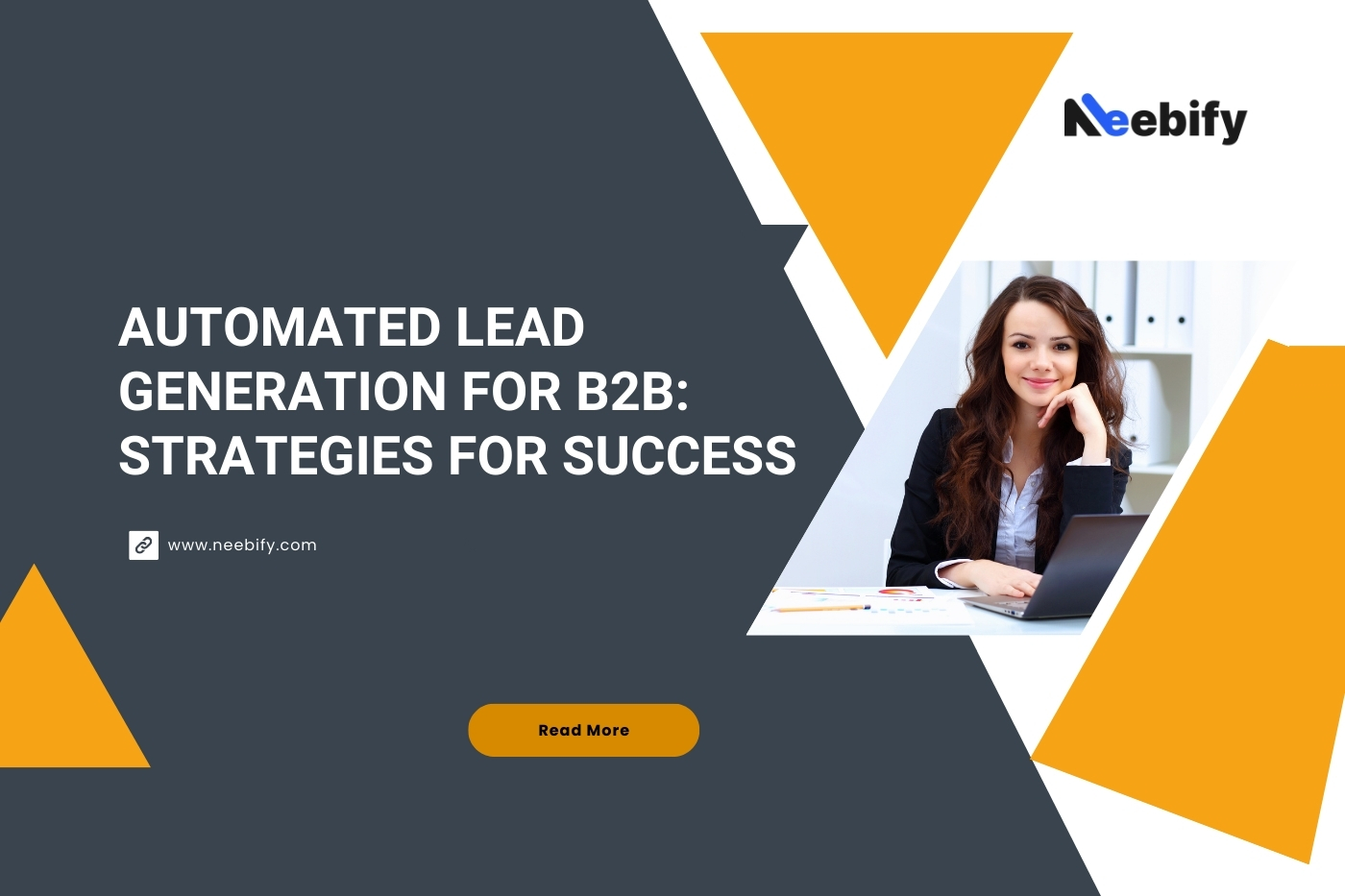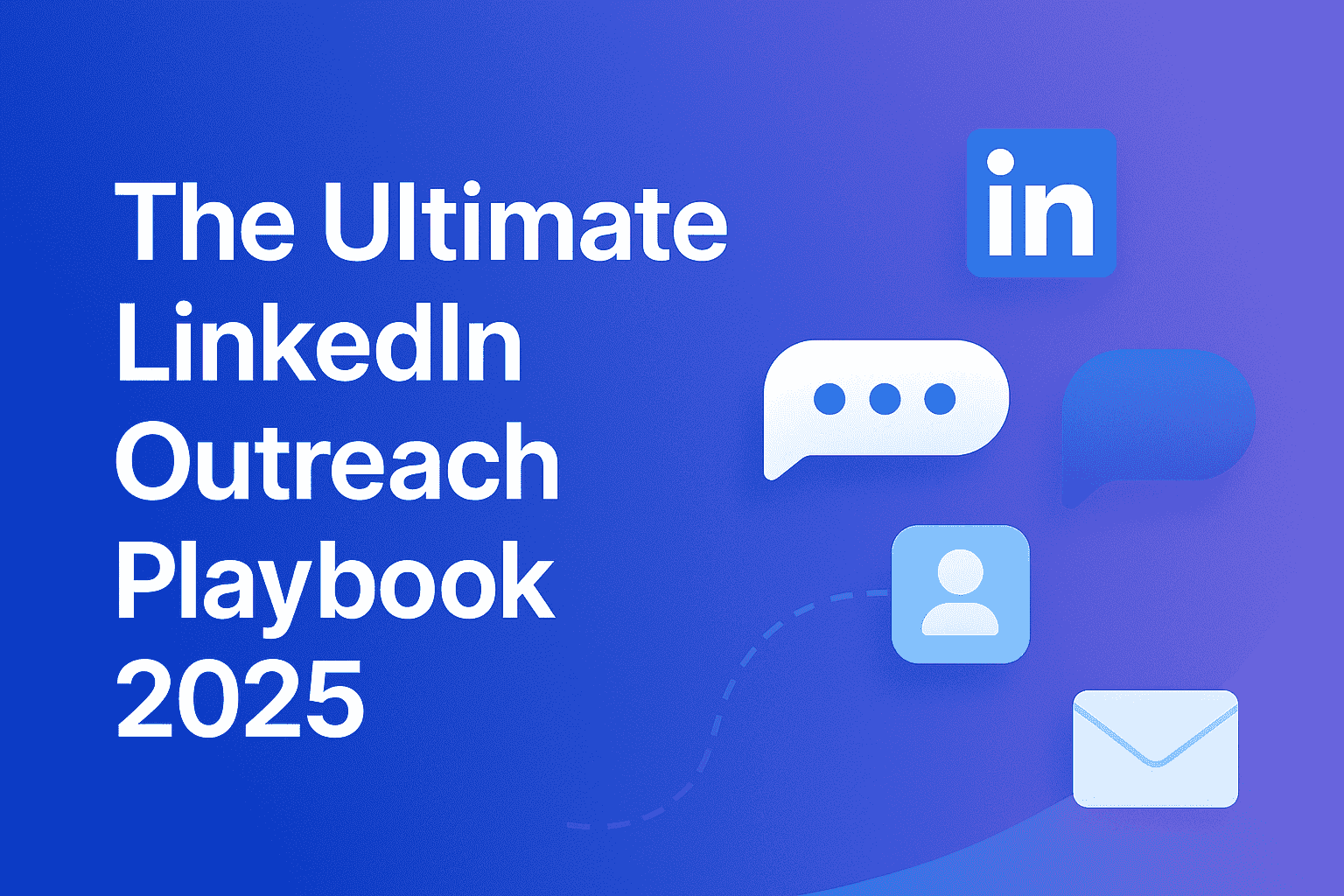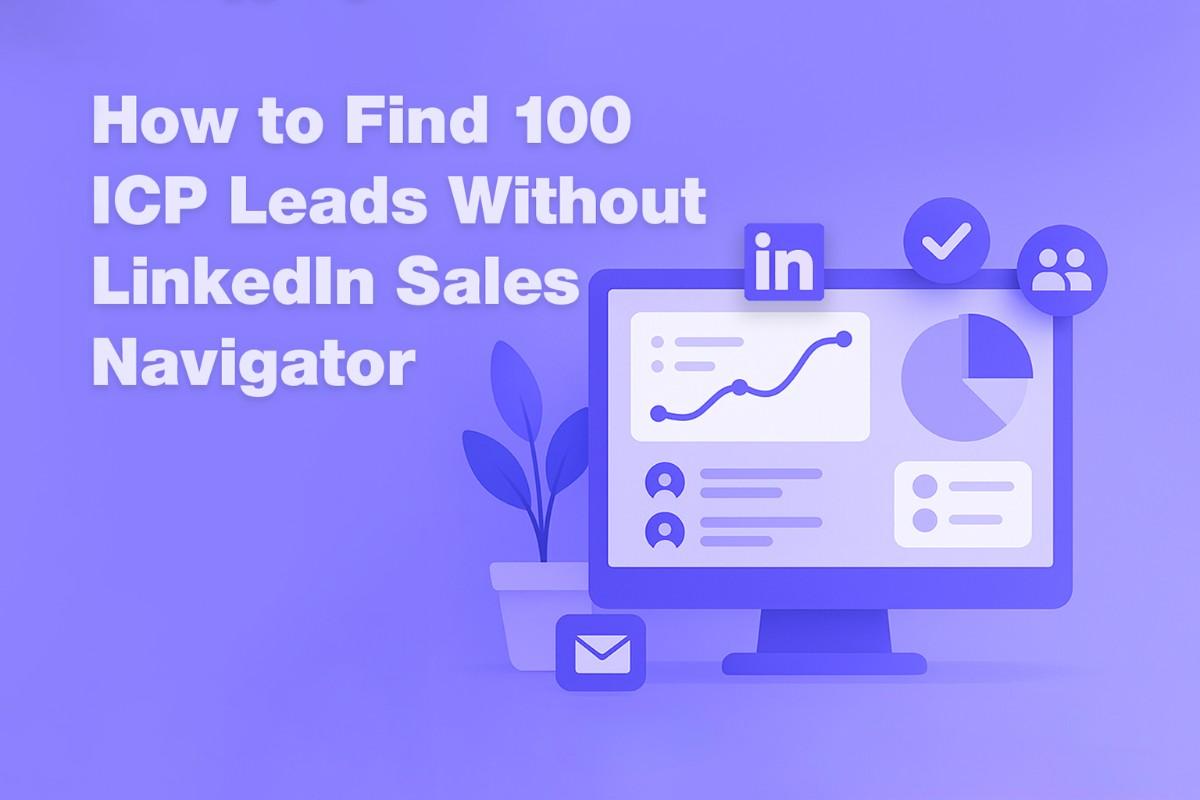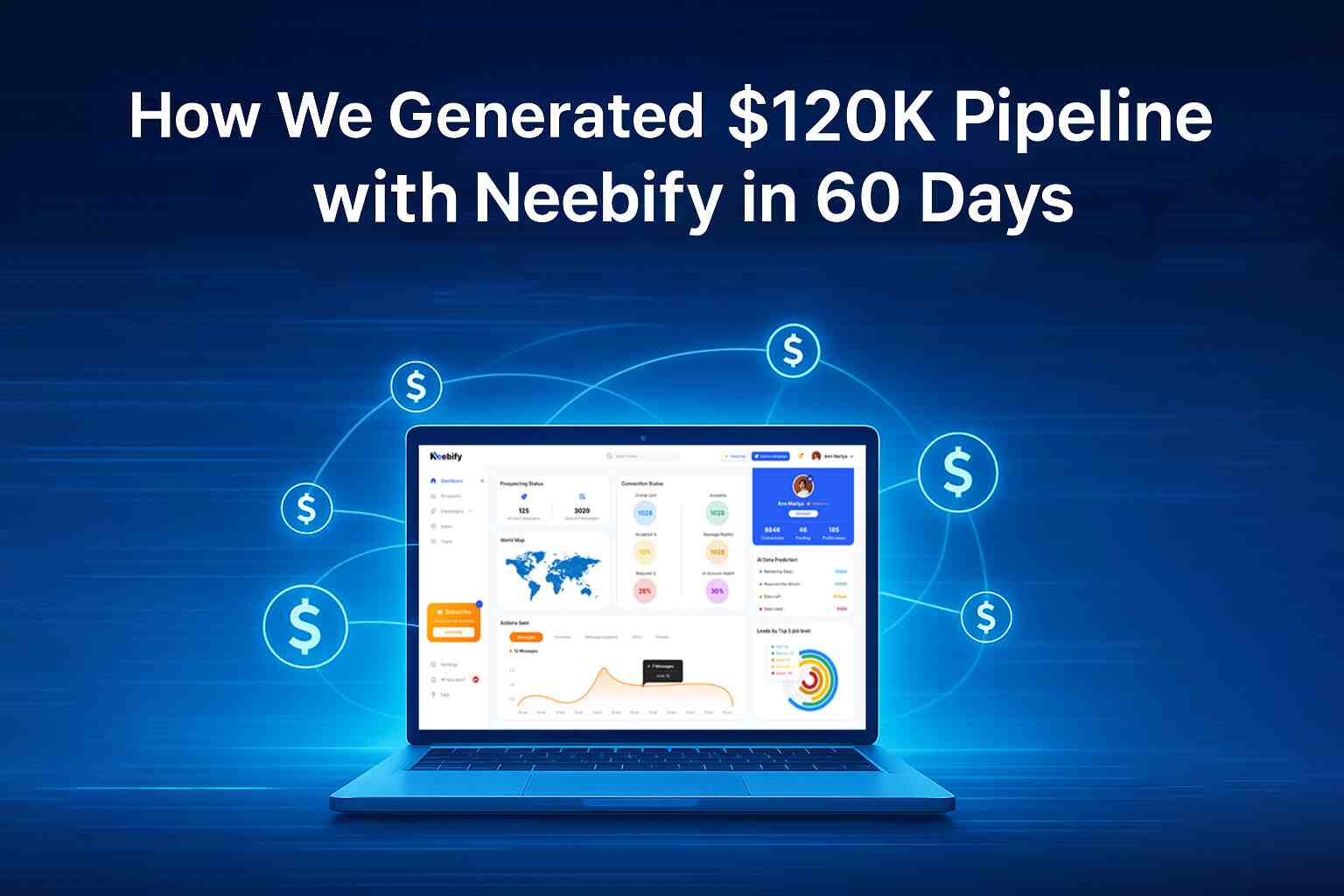Table of content
What is Automated Lead Generation for B2B?
Automated lead generation for B2B denotes the use of technology and software tools in identifying, attracting, and qualifying potential business clients without any interference. It involves the automation of different marketing and sales activities, including things like email campaigns, social media outreach, content marketing, and data analysis, all in efforts toward generating leads more efficiently. By integrating automation into the workflow, businesses can make the process of lead generation speedy and resource-efficient to ensure a seamless flow of high-quality leads into their sales pipeline.
Tools for automated lead generation would typically be integrated with a customer relationship management system, whereby the business uses it to handle leads and trace their life cycle from first contact to conversion. Such tools could include predictive analytics, AI-driven insights, and even personalized messaging in order to optimally fit the lead generation process at the target audience's needs and behaviors.
The primary purpose of B2B automated lead generation is to ensure maximum efficiency of marketing strategies due to improved lead quality, which does tend to convert better. And all this can easily be achieved by automating routine performances and availing the data-inspired insights that allow businesses to get on with the real business of closing deals and fostering relationships rather than wrestling with the manual generation of leads.
Types of B2B Lead Generation
B2B lead generation strategies are of various types depending on the kind of business model and target audience. Following are some identification types which may put the method into action in the best way to reach potential clients for a business. Some of the most common types can be listed as under:
1. Content Marketing:
Content marketing is the kind of strategy that involves creating and sharing valuable, relevant content to attract and engage a clearly defined audience. It may take the form of blog posts, white-papers, e-Books, webinars, and videos that could talk about the pain points of potential customers. In fact, a company offering solutions through provided content actually assumes a leadership position in that industry and attracts quality leads interested in its products or services.
2. Automation of Email Marketing:
E-mail marketing remains one of the highest-quality means for generating B2B leads. Automation enables companies to send targeted and timely e-mails based on prospect behavior, such as downloading resources or landing on specific pages of the website. Automation tools can segment the audience, deliver relevant content with their needs in mind, and help nurture the lead with strategically designed email sequences that give them the best chance of converting.
3. Social Media Marketing:
LinkedIn, Twitter, and Facebook can bring about immense opportunities in B2B lead generation. Such tools help in scheduling the posts, engaging the followers, and tracking the interaction that may further facilitate adequate connection with potential clients. Paid social media ads can be micro-targeted to hit specific executives in an industry, hence further benefiting the effort of B2B lead generation.
4. Search Engine Optimization (SEO):
SEO plays a vital role in B2B lead generation, as this is how organizations can make their online presence felt among people. Optimization of any website through content and building backlinks helps an organization rank higher on SERPs to drive organic traffic to one's website. Automated keyword research, content optimization, and performance tracking tools will definitely be a helping hand in performing SEO operations in an efficient manner.
5. Pay-Per-Click Advertising:
With PPC advertising, such as Google Ads, a business will get in front of potential customers who are looking for the best solution they have to offer. Campaigns can be optimized in real time, using automated bidding strategies and tools to place ads so that businesses achieve the best return on their ad spend.
6. Webinars and Virtual Events:
Webinars and virtual events have become extremely popular for B2B lead generation in recent times, especially in the digital era. This provisions for interactive platforms where businesses can display their expertise while they get to engage with potential clients by way of sign-ups. Events promotion, registrations of attendees, reminders, and follow-up after the event can be automated using tools.
7. Lead Magnets and Landing Pages:
Lead magnets, like free trials and demos, or downloadable resources, go a long way in capturing contact information from potential clients. Automated landing page tools will help create high-converting pages, ensuring it fits with the overall lead generation strategy for the rest of the business that will streamline lead attraction and capture.
This enables interaction with website visitors right according to their queries on an automated note for driving them through the sales funnel. With AI-driven chatbots, businesses can engage with prospects 24/7, instantly qualify leads, and route them to the right member of the sales team for follow-up.
Why is Automated Lead Generation Important for B2B?
B2B companies, for which automated lead generation is crucial, don't just reduce costs by boosting efficiency but also offer a strategic way of finding and converting potential clients. Here's why automated lead generation becomes so important to B2B businesses:
1. Efficiency and Productivity Improvement:
Businesses would, therefore, achieve greater efficiency through the automation of repetitive activities, including email outreaches, follow-ups, and data entry. Sales and marketing would now have the time to deal with qualified leads and close deals without getting entangled with menial, repetitive tasks. This shift gives room to organizations in managing leads better and scaling up activities without a major spike in resources.
2. Consistent Lead Flow
It is automated and hence assures consistency in the lead flow into the sales pipeline. Automation is not erratic like manual methods, which are eminently susceptible to the vagaries of human effort. This consistency enables the business to maintain the momentum of the sales process and, as a quid pro quo, avoid peaks and valleys that are commonly seen in manually generated leads.
3. Quality Leads:
Automation tools can use data analytics, coupled with AI, to find and predicate high-quality leads on particular terms regarding company size, industry, and behavior on the website. The result of this is conversion rate improvement for businesses by focusing on leads that are most likely to convert.
4.Better Data Management and Insights:
Data management and analytics are further functionalities that automated lead generation will entail. The tools can track interactions, analyze lead behaviors to furnish insights into what strategies prove effective and where improvements are needed. With such a data-driven approach, firms make informed decisions purposed at optimizing their lead generation efforts to continuously improve on the strategy employed for lead generation.
5. Personalized Customer Experience:
Personalization is one of the key success factors in B2B lead generation. Audience segmentation is made possible by the inbuilt capacity of automated tools, together with personalized communications implored to prospective customers. By sending relevant content and offers based on a prospect's interests and behavior, businesses can build stronger relationships and increase the likelihood of conversion.
6. Scalability:
As businesses grow, so does the need for lead generation. Automated lead generation tools can help scale the company's marketing and sales activities without a similar increase in workload. Through automation, more leads can be handled by expanding into new markets or launching additional campaigns with the required flexibility to grow without compromise on quality.
7. Cost-Effectiveness:
While the investment in automation tools is upfront, the costs saved in the long run could be huge. A reduction in manual labor, an increase in conversion rate, and an increase in the optimal utilization of marketing expenditure would allow businesses to have better returns on investment. It ascertains that better returns are achieved with the more focused and efficient use of resources, saves from waste, and more results.
8. Better Nurturing of Leads:
Automation makes this important element of B2B sales easier to manage. With the help of workflows in automation, get the right content in front of the right prospects at the right time and keep those prospects engaged down the path to a buying decision. This, in turn, contributes to maintained top-of-mind awareness and the building of trust with potential clients at all times.
9. Faster Response Times:
The difference between getting a deal or not in today's highly competitive business environment is determined by response time. In addition, automated lead generation tools enable business delegates to immediately respond to an inquiry or respond to a prospect, by which one could save time in transitioning from one funnel stage to another qualified lead. Better chances of converting a lead with fast responding times are hence leading to a competitive advantage.
10. Integration with Other Business Systems:
The other thing is that good lead automation is often well-integrated with other business systems, be it CRM, marketing automation, or analytics. Integration will enable not only a more cohesive and holistic view of managing customer relationships but also against the platform of both sales and marketing efforts. Having all the systems working together can optimize and streamline business processes for better overall results.
Conclusion
It automates lead generation to high efficiency in B2B businesses for efficiency, quality enhancement of leads, and scaling up marketing operations. It has ensured, through the workings of different automation tools and strategies, a continuous supply of high-value leads in business development, ensured personalized marketing interactions, and promised a good return on investment. Through content marketing, email automation, and chatbots, automated lead generation is flexible and scalable to overcome today's competitive B2B landscape. Companies embracing automated lead generation are those that will be positioned to take full advantage of technological changes that enable greater sustainable growth.
Get your next meeting in a
matter of minutes.
Free Trial
Latest
The Ultimate LinkedIn Outreach Playbook 2025
A practical, modern guide to mastering LinkedIn outreach in 2025 — learn how to boost reply rates, p
12/1/2025How to Find 100 ICP Leads Without LinkedIn Sales Navigator
Generating 100 targeted ICP leads doesn’t require LinkedIn Sales Navigator. Learn how to leverage fr
11/28/2025


